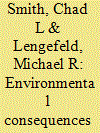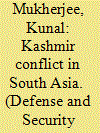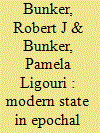|
|
|
Sort Order |
|
|
|
Items / Page
|
|
|
|
|
|
|
| Srl | Item |
| 1 |
ID:
173759


|
|
|
|
|
| Summary/Abstract |
Warmaking and war preparation have changed significantly in the 21st century. A number of scholars have documented and analyzed these changes. Drawing on work focused upon “new war” and “new militarism,” we argue that one facet of these practices has received little attention—the environmental consequences of “new militarism.” Specifically, we contend that “asymmetric war” through the mechanism of risk-transfer militarism results in increased carbon emissions. Our analyses utilize fixed effects models for 126 countries using international panel data from 2000 to 2010. We sketch the differences in these outcomes for both developed and developing nations, contextualize carbon emissions within both times of economic prosperity and decline, provide evidence of the differential effects on carbon emissions by a nation’s world-systems standing, and provide empirical evidence of the rise of risk-transfer militarism and its negative effects on the environment.
|
|
|
|
|
|
|
|
|
|
|
|
|
|
|
|
| 2 |
ID:
128040


|
|
|
|
|
| Publication |
2014.
|
| Summary/Abstract |
This article looks at the Kashmir conflict in South Asia, which has been going on since 1947, when India and Pakistan became independent from British colonial rule. After looking at some historical background, the article looks at both the external dimension as well as the internal dimension of the conflict. The external dimension tends to focus on Indo-Pak relations over Kashmir and the internal dimension looks at India's repressive state policies within the state of Kashmir. This article uses Mary Kaldor's "New War" thesis as a theoretical framework to understand the situation and pays special attention to the conflict's very complex and multifaceted nature. The article argues that although the levels of violence have differed from time to time in the region since 1947, today the conflict seems to have less to do with Indo-Pak relations or the external side of things and has more to do with the internal dimension and India's undemocratic ways within Kashmir. Today, Kashmir is one of the most militarised conflict zones in the world. The stationing of the Indian military and paramilitary forces in the region has only exacerbated the situation since it is the security personnel who cause much of the problem. The Armed Forces Special Powers Act gives these security forces extraordinary powers in the region, which they often abuse. The armed forces have no real understanding of the local culture or sympathy for local religious sentiments. Poverty, corruption, administrative failure, police brutality, identity politics and human rights abuses are some of the key features associated with this conflict. Methodologically, a number of interviews were carried out with the local people in the region recently. From the data gathered through the interviews, it is very obvious that the people still feel very oppressed and that the situation is still very volatile, fraught with uncertainty. Finally, after making an assessment of the situation, the article tries to suggest methods of peaceful building and conflict management as the way forward.
|
|
|
|
|
|
|
|
|
|
|
|
|
|
|
|
| 3 |
ID:
144345


|
|
|
|
|
| Summary/Abstract |
This article is intended to serve as a ‘think piece’ which invites readers to view current perceived changes to the conduct of modern warfare in the broader historical light outlined by proponents of epochal change theory. Neo-medievalists have gone a step in this direction and posited that these changes represent the future of warfare and are evidence of a return, in a sense, to the primary tenets of political and social organization that existed in the period commonly referred to as the Middle Ages. The contention herein is that the answer gains more accuracy if one takes a much longer historical standpoint beginning with classical civilization and moving through the medieval period to our modern world. With regard to the present, this epochal warfare analysis projects that a shift from a Westphalian to post-Westphalian global system is underway. During this period of transition – as in the transition periods between epochs which have preceded it – the dominant state form undergoes a deinstitutionalization process, and war is less about traditional issues of state sovereignty, and instead increasingly over ‘what the new form of social and political organization will be’.
|
|
|
|
|
|
|
|
|
|
|
|
|
|
|
|
| 4 |
ID:
067169


|
|
|
|
|
|
|
|